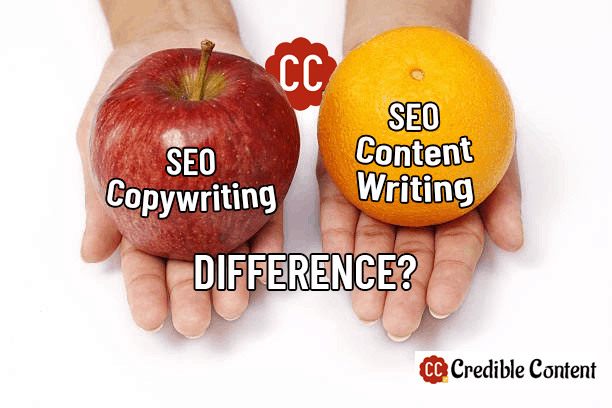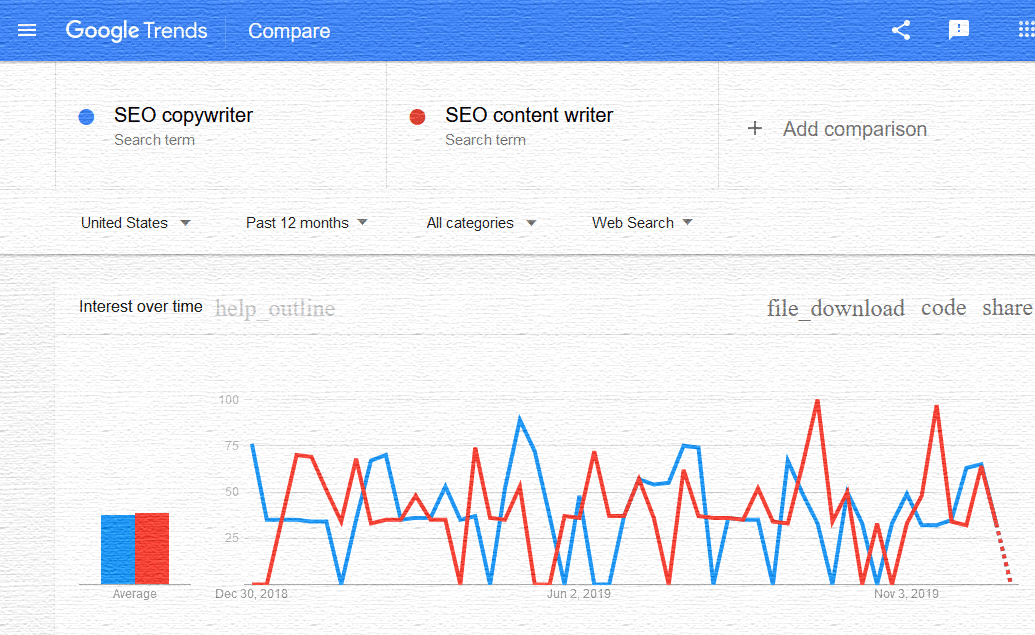
Difference between SEO copywriting and SEO content writing
Should you hire an SEO copywriter or an SEO content writer? What is the difference between SEO copywriting and SEO content writing?
Whether there is a difference or there isn’t any difference, depends on whom you are dealing with and what sort of writing you need.
There is definitely a difference between a copywriter and a content writer.
You may like to read Difference between copywriting and content writing.
Copywriting is sales oriented. It is often used in advertising and wherever your writing needs to sell.
For example, on a landing page you require the services of a copywriter.
When you broadcast an email marketing campaign, you get it written by a copywriter.
Even the main webpages of your website including the homepage, the services page, the company profile page, all these pages are written by a copywriter, ideally, but most of the people get them written by a content writer.

Copywriter increases sales content writer increases visibility
You need a copywriter for your main website pages because people will be going through these webpages before deciding whether they want to buy from you or not.
This is where the difference is blurred.
A content writer writes to inform and educate, a copywriter writes to sell and generate leads. Though, in some manner, even a content writer helps you sell and generate leads.
Copywriters are age-old. They have been writing copies since time immemorial.
Content writers are a new breed. Writers who write for websites and blogs are called content writers.
What is the fundamental difference between copywriting and content writing?
The primary purpose of SEO content writing is to generate organic traffic, mostly by search engines.
You may like to read: 10 SEO content writing tips for your small business.
It is written to feed the search engines quality content so that the search engines rank your content well and consequently, send organic traffic your way.
Copywriting converts the traffic generated by content writing into leads and sales.
The language is different. In content writing the language is more laid-back. It informs, engages and entertains.
Copywriting convinces you to buy. It lays bare the greatest benefits of the product or the service the piece of copywriting is promoting in a highly convincing manner.
It generates a sense of urgency – as if you’re going to lose big time if you don’t purchase there and then.
Content writing on the other hand doesn’t generate a sense of urgency. It simply informs you.
For example, if I’m writing a review of a gadget, I’m not necessarily selling you that gadget. I’m just telling you about the features that it has and the features that it doesn’t have. Then I leave it up to you whether you want to buy that gadget or not.
In the process, I’m generating traffic for the website. People who are interested in that gadget may land on my website and in case they need to buy it, they may buy it from my website.
Copywriting tells me to buy it. Just like content writing, it also informs me about the best features, but it conveniently either ignores the bad features or portrays them as something of an advantage.
Is there a thing called “SEO copywriting”?
As I said above, whether you want to call a particular piece of writing “SEO copywriting” or “SEO content writing” depends on who is writing and how you want to view your writing.
From the perspective of an average client, it’s a bit difficult to differentiate between SEO copywriting and SEO content writing. An average client wants your writing to generate more business whether you are a copywriter or a content writer.
Some clients are aware of the difference. Recently I wanted to know how my content writing services are helping one of my clients for whom I have been writing blog posts for a few months now.
He wrote that right now he isn’t concerned about immediate gains. He understands, he said, the competition is very tough in his field and it will take a lot of time before his website experiences some major change in search engine traffic.
He doesn’t expect my writing to get him more customers. He wants my writing to improve his exposure for the related keywords on Google.
Coming back to the highlighted question: is there a thing called SEO copywriting?
There are many people who call themselves “SEO copywriters”. Many believe whenever you are writing for a website or a blog, the sole purpose of your writing is promoting a cause.
Hence, when you are promoting a cause, you are copywriting.
In that sense, even when you’re writing content, you are copywriting.
Even when you are writing for a blog, ultimately, you are canvassing for a business or an idea.
Referring to the above gadget reviews example. I’m actually writing gadget reviews for a client who sells on his website as an Amazon affiliate.
When people come to his website to read reviews, he expects them to click the links and then buy from Amazon, earning him commission in the process.
When I’m writing his reviews, I’m conscious of that. I know that people are supposed to purchase after reading the reviews.
Even when I’m writing seemingly impartial reviews, the reviews are written in such a manner that if people want to buy that gadget, the review is not going to deter them or discourage them in any manner.
When you’re writing for your business blog, aside from the fact that you are informing and educating your prospective customers and clients, you are also constantly representing your business – you are writing on behalf of your business.
For example, when I’m writing for my own Credible Content Blog, I’m also promoting my content writing and copywriting services.
This happens subtly, but it definitely happens.
Consequently, many writers, even writers of repute on the Internet, insist that every good content writer is fundamentally a copywriter.
Which brings us to the conclusion that there IS a concept called SEO copywriting.
Do people search for “SEO copywriting” and “SEO copywriter”?
Here is the Google trends graph. The blue information is SEO copywriting and the red information is SEO content writing. This data is for United States. You can see that more people search for “SEO copywriting”.

Google trends comparing SEO copywriting and SEO content writing
The case is slightly different for the terms “SEO copywriter” and “SEO content writer”. Slightly more people in the US search for SEO content writer compared to SEO copywriter.

Google trends comparing SEO copywriter and SEO content writer
As I have explained above, when it comes to writing for the web, these terms are interchanged, and this is where there is confusion.
In the traditional sense, there is no confusion as people know who a copywriter is and who is a content writer, but when it comes to writing web content, these terms are often mixed up.
What exactly are people searching for when they’re searching for “SEO copywriter”?
If people get mixed up between SEO copywriting and SEO content writing and don’t know the difference, how do you find the searcher’s intent, especially as a writer?
For example, if I want to target someone looking for an SEO copywriter, how do I know if the person is actually looking for a copywriter to write marketing material or content writer simply to improve his or her search engine rankings? Because, I know the traditional definition of copywriting.
Is the intent of the person to find
- Someone who can write blog posts?
- Someone who can write web page copy?
- Someone who can write a sales pitch for a landing page?
- Someone who can write information articles?
Since there might be thousands of people looking for an SEO copywriter, as a content writer who is constantly coming across clients who have a blurred notion of what is the difference between the two, I need to optimize my website for both the terms: “SEO copywriter” and “SEO content writer”, even if personally, I know there isn’t much difference.
When is the right time to hire an SEO copywriter or someone who can provide SEO copywriting?
Frankly, any time you want to improve your SEO. Search engine optimization is the central topic here.
Ever since Google aggressively started updating its ranking algorithm, it has been focusing on featuring high-quality content that is written to inform and educate people rather than simply to improve search engine rankings.
The process of improving SEO is longwinded. How much time it takes you to improve your organic SEO depends on your competition (other things taken care of).
The right time to hire an SEO copywriter is
- When you need high-quality content to improve your conversion rate and engagement levels.
- When you want to publish high-quality content regularly.
- When you want to publish content that is search engine friendly, optimized for your keywords, but at the same time, reader friendly.
- When you are looking for a copywriter or a content writer who can write great content based on searcher’s intent.
You can use an SEO copywriter to get written
- SEO friendly blog posts.
- SEO articles.
- Services pages that are optimized for search engine rankings.
- PPC landing pages.
- Authoritative blog posts and articles to be published on websites like LinkedIn and Medium.
The basic idea is striking the perfect balance between good quality and SEO. Whether you hire an SEO copywriter or an SEO content writer, ultimately, it all rests on how much exposure and consequently, how much business the writing can generate.
For the time being, for an average client, there isn’t much difference between SEO copywriting and SEO content writing. Both are great forms of writing as long as they convince and convert.







